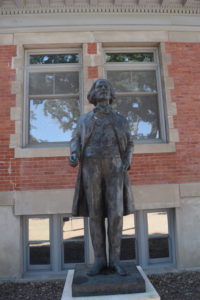By Donald H. Harrison


PASO ROBLES, California – The Paso Robles Historical Society currently is housed in a building that had been donated for a library many years before by the philanthropist and industrialist Andrew Carnegie – one of 3,000 libraries he donated throughout the world. Outside the building there is a statue, but it is not of Carnegie nor of Drury James, the man who recognized that the city’s hot springs and mud baths could be made into a tourist attraction and who built the grand Hotel de El Paso de Robles.
Instead the statue is of a man who was widely regarded in the late 19th and early 20th centuries as the world’s premier pianist, Ignacy Jan Paderewski. Drawn by the mud baths and hot springs that assuaged the neuritis in his right arm, he was a frequent guest at the Hotel El Paso de Robles. So enchanted by the area was he that he purchased several thousand acres, where he grew almonds, walnuts, fruits of various descriptions and grapes for wine. Between 1914 and 1940, Paderewski and his wife Helena made it a point to come to Paso Robles for rest and relaxation whenever his concert schedule in the United States permitted.
Adam Zamoyski, who wrote a biography of Paderewski in 1982, described Paderewski’s popularity in a manner that brought comparisons to Frank Sinatra, Elvis Presley, and the Beatles to my mind. He was not only a great musician but he had a charisma about him that made him a celebrity. People used to mob him in an effort to shake his hand, or to touch his considerable head of hair.
The pianist was a generous man, a philanthropist who helped to raise money for a variety of good causes, frequently donating the proceeds of his concerts as well as money from his own considerable bank account to further causes in which he believed.
Of these, none meant more to Paderewski than reestablishing Poland as an independent state. Throughout much of his early life, Poland had been divided by three great neighboring empires: Russia, Austria-Hungary, and Germany. Because he was an internationally honored celebrity, Paderewski developed friendships with American presidents, and European kings and prime ministers. He had a great influence on U.S. President Woodrow Wilson, with whom he had a mutual admiration society. At the end of World War I, at the Versailles Conference, Wilson accepted Paderewski’s pleas for an independent Poland. While Western European Allies had been initially skeptical, because Russia pulled out of World War I in the wake of the Communist Revolution, the Allies came to favor having an independent country as a bulwark against both Germany and the Russians.
Paderewski was very sympathetic to the Jewish people, according to biographer Zamoyski. When Paderewski was a boy, his father was afflicted with serious eye troubles – so serious he could not read the newspaper. Paderewski read it to him, but knowing that his father fervently favored the French cause in the Franco-Russian War, he changed the facts of war reportage to make it sound as if the French were winning, rather than losing. When the elder Paderewski went into town, he spoke happily about all the French victories until his listeners set him straight. He came home very angry at his son but Szmul, a Jewish barber in their town of Sudylow, successfully intervened saying that the boy simply was trying too hard to be kind.
Later, when Paderewski had already become an international celebrity, a right-wing political figure in Poland, Roman Dmowski, retaliated against the Jews of Warsaw for not supporting him in a Duma election that he ultimately lost by urging his allies to boycott Jewish businesses. Paderewski had allied with Dmowski on other issues and was distressed while on a concert tour to learn that the politician had included his name among those on the committee favoring a boycott. The news of Paderewski’s name being included reached the United States, where Jewish groups urged that his concerts be boycotted. Paderewski subsequently issued a statement disassociating himself from Dmowski’s boycott, settling the issue, according to Zamoyski.
Notwithstanding disagreements, Dmowski and other Polish politicians favored Paderewski representing Polish interests at Versailles. After Polish independence was guaranteed, Paderewski became the new nation’s first prime minister. But he proved to have a better temperament for concerts and international diplomacy .When he felt his policy proposals were being undermined by politicians, he resigned as the prime minister but for a while continued to serve as his country’s spokesperson at the League of Nations. Ultimately, he left the foreign ministry and returned to his landholdings in Paso Robles and at Rion-Bosson, Switzerland.
After five years of not playing the piano, he started doing some finger exercises while in Paso Robles and found, to his surprise, that his dexterity had improved without the constant concertizing. He thereupon embarked on a grueling course of piano practice and, needing to refurbish his finances, called upon his American manager to book another concert tour. It turned out to be a grand success, not only monetarily but artistically.
After Hitler came to power in Germany, Paderewski raised funds through his concerts for the relief of German Jews.
In addition to the sculpture of him, which was erected in November 2012 by the city and county local governments in cooperation with the nation of Poland, Paderewski is honored in Paso Robles with a four-day music festival every November in which there are professional concerts and youth concerts, among other musical events. There also are cultural exchanges between the City of Paso Robles and the province of Tarnow, Poland.
Paderewski’s music, personality, and generosity were causes for celebration and homage in both countries.
*
Donald H. Harrison is editor of San Diego Jewish World. He may be contacted via donald.harrison@sdjewishworld.com